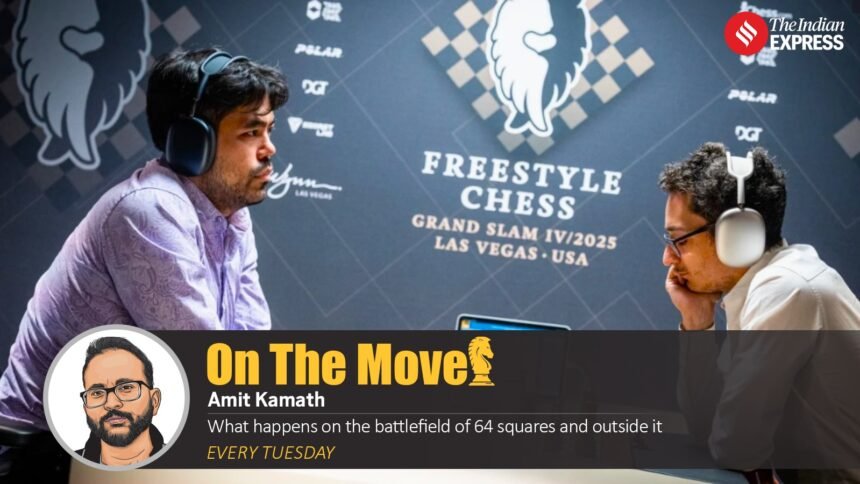A loud gasp reverberated around the playing hall which was created in Las Vegas’ Wynn as the game between Magnus Carlsen and Wesley So entered the end game and the world no 1 made a blunder with his rook that allowed him to be checkmated in a few moves. The gasp from the fans was so loud that it was even audible on the live broadcast.
Carlsen at that stage was wearing noise cancellation headphones. So wasn’t Wesley.
These were unique quirks of the recently-concluded Las Vegas leg of the Freestyle Chess Grand Slam Tour: live audiences in the arena who had access both to live commentary and to the eval bar and players wearing noise cancellation headphones. Thanks to the first quirk, some nuances of games — like the fact that checkmate was inevitable in a few moves — that probably would have been lost on the chess-following folks was now apparent.
That access to information for fans led to plenty of criticism of the Freestyle Chess Grand Slam event by players like Fabiano Caruana, who unlike players like Carlsen and Hikaru Nakamura are much more measured in their opinions.
But so incensed was Caruana by the fact that fans were allowed to hear commentary and see the eval bar in real-time and were reacting loudly like at any other sports event, that he criticised the organisers in an interview to their own social media handle after the event was over.
Caruana complained that in his own critical game with Nakamura later on in the tournament — by which time organisers had made the wearing of noise-cancelling headphones mandatory for the players — he could hear the audience’s reactions despite wearing the headphones.
“In the match (against Nakamura which he lost), I started to get very annoyed at the whole tournament. I don’t think it should come down to outside interference. Not to make excuses, but I mean, the spectators are basically just yelling when we have five seconds each. Hikaru was crushing me and then, he probably had some mating chances, but it wasn’t easy. He had 5 seconds. He went back with the queen. I was back in the game. And around this moment there was just yelling (from the fans). I mean like very (loud yelling). I’m not exaggerating at all. It was just screaming in the audience and you can’t play (like that) with five seconds. So we both blundered. I could basically have mated him and also won his queen on two different occasions. It just leaves a bad taste,” Caruana had told the media team of Freestyle Chess after the tournament ended.
Story continues below this ad
This issue was such a sticking point that it was debated extensively for during the players’ meeting before the Las Vegas tournament started, where multiple players raised the issue. Allowing in-arena fans this crucial piece of insight during a game is a debate that is likely to rage louder in the coming days, especially with chess also embracing itself as an esport: the world’s top players are currently in Riyadh playing at the Esports World Cup, where the noise cancelling headphones are back as players play in front of a much bigger arena filled with fans.
Allowing access for fans to commentary and the eval bar in the playing hall was an attempt from Freestyle Chess to make the game much more accessible. And interesting. To make a spectator sport out of chess. Because that opens the doors to invite a wider cross-section of fans into the arena and make them understand the drama that’s happening on the chess board. After all, that’s eventually how you can raise some money from ticket sales as well.
But the ploy seems to have backfired.
Walk into a playing hall during games of a chess tournament — almost every chess tournament from Norway Chess to the Tata Steel Rapid and Blitz event in Kolkata — and you will be greeted with pin-drop silence. Try as much as whispering something into the ear of the person sitting next to you, and you will have stern librarian looks thrown at you. Try and peek at your mobile phone during a game, and chances are you will be politely asked to leave.
There is a reason why chess tournaments have not tried to make it a spectator sport and why they have people assigned to remind fans walking into the playing hall that they need to keep their phones tucked away into their pockets at all times.
Story continues below this ad
As Caruana pointed out on his own podcast later, unlike a tennis tournament — where chair umpires also frown upon fans shouting in the middle of points — a shout or a loud gasp at a chess tournament can hand a player a key piece of information that could be the difference between winning and losing. A gasp from the audience could alert a player that their opponent had blundered.
“They didn’t take the security as seriously as it should have been,” Caruana added.
If this seems like regular chess grandmaster paranoia, it might be crucial to remember that at a previous Chess Olympiad, one player had cheated just by having their team captain standing at a different spot to view the game which would send a signal to the man on the board that he had to move a particular piece on the next move.
It’s absurd to have players be put through stringent fairplay safety checks before the games start only to have neutral fans hooting and gasping during games, which is almost like allowing the players to get a peek at the eval bar themselves.
Story continues below this ad
This is why at the World Championship events — the most prestigious tournament in chess with millions of dollars at stake — the players are behind sound-proof and one-way glass rooms.
Caruana said that while he was all for chess tournaments trying to monetise viewing experiences, this was not the way to do it.
“Let’s say you want to make chess a business, I’m not an expert, but I can’t imagine that the way towards that is live ticket sales. I just don’t see it. I think if you want to make chess a business, you have to sell it to Amazon Prime or Netflix,” Caruana said.
The noise from the chesshall is clear: stay quiet or go home.







